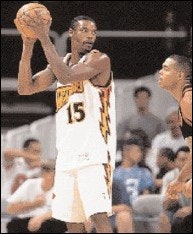The Sprewell case sheds some light on disciplinary standards

The Golden State Warriors hired P.J. Carlesimo as head coach for the 1997-98 season, Latrell Sprewell's sixth season with the team. Although the two initially enjoyed a good relationship, friction began to develop during the season between Carlesimo and Sprewell.
We all know what happened next. At a closed-door practice last December 1, Carlesimo asked Sprewell to leave for failing to properly perform a drill, and Sprewell either walked to or lunged at Carlesimo, placed his hands around Carlesimo's neck and said, "I will kill you." Sprewell was led to the locker room by an assistant coach, but after showering and dressing, Sprewell returned to the practice facility, walked with "a purpose" toward Carlesimo and managed to land at least one grazing punch on the coach's right cheek.
Both Sprewell's team and the National Basketball Association then threw some punches of their own. The Warriors initially suspended Sprewell for 10 days, and after NBA Commissioner David Stern suspended Sprewell for one year, the Warriors decided to terminate Sprewell's contract, which had almost three seasons remaining.
The matter was then sent to arbitrator John Feerick, whose 106-page decision in the case has provided grist for editorial writers ever since it was issued on March 4. Feerick ruled that the NBA's one-year suspension was not justified, and reduced it to the balance of the 1997-98 season. The 68 games that Sprewell will sit out will cost him $6.4 million in salary, but Feerick's reinstating of the balance of Sprewell's Warriors contract ensures he will be paid a total of $17.3 million for those two seasons.
It's doubtful most workers in the athletics and recreation field can relate to those sorts of figures, but the case has some relevance to employer-employee relations in general.
In the sports industry, some employees are unionized, but most are not. A few non-union employees may have clauses in their individual contracts requiring disputes (such as discipline or contract interpretation issues) to be decided by a grievance and arbitration process. However, most employees in the sports industry must go to court to sue an employer for breach of contract, wrongful termination, and other employment and contract-related disputes. Employees who do not have a written contract and are not unionized are considered employees-at-will (see Sports Law Report, November 1997, p. 22). The Sprewell case is most applicable to employees who, like NBA players, are unionized.
Feerick's decision emphasized fairness and focused on the concepts of "just cause" and the "arbitrary and capricious standard." He cited both language in the NBA collective bargaining agreement ("In grievances regarding discipline, the issue to be resolved shall be whether there has been just cause for the penalty imposed") as well as language from a 1996 case involving United Paper Workers and Rayonier Inc. ("If management acts in good faith upon a fair investigation and fixes a penalty not inconsistent with that imposed in other like cases, an arbitrator should not disturb it").
In addition, Feerick made two judgement calls in applying the facts of the Sprewell case to the legal framework he established. First, he determined that Sprewell's conduct was born of anger and passion and did not constitute an act of moral turpitude. Feerick found that the two incidents between Carlesimo and Sprewell, although separated by between 10 and 20 minutes, were in effect one matter. The arbitrator did not agree with the NBA's argument that there were two different incidents - the first born of anger and the second premeditated.
Second, with respect to whether the penalty imposed was arbitrary and capricious, Feerick noted that "there has never been a case of contract termination in the history of the NBA for a physical assault or a one-year suspension for such conduct or, it appears from the record, in the sports of baseball and football." Feerick cited cases involving Kermit Washington (26-game suspension for fighting another player), Vernon Maxwell (10 games and a $20,000 fine for going into the stands and attacking a fan), Dennis Rodman (six games and a $20,000 fine for head-butting a referee; 11 games and a $25,000 fine for kicking a photographer in the groin), and Nick Van Exel (seven games and a $25,000 fine for pushing a referee over the scorer's table).
Two other cases mentioned by Feerick are also worth noting. When Alvin Robertson, a Detroit Pistons player, choked his director of player personnel, Billy McKinney, he received an indefinite suspension from the team and then was traded but was not suspended by the league. And when Allen Bristow, then general manager of the Charlotte Hornets, attacked and attempted to strangle Arn Tellem (who coincidentally is Sprewell's agent) during the course of contract negotiations for Kendall Gill, the NBA merely issued a reprimand. However, some critics argue that the Sprewell incident - because it involved physical violence directed at a direct supervisor, not an off-the-court incident or an employee fighting another employee - was a case without precedent and, therefore, previous disciplinary decisions by the league should not have been considered.
While the impact of the Sprewell case is probably limited in a non-sports setting, it's an extremely important one for professional sports and particularly the NBA. It establishes a precedent - 68 games and $6.4 million - for the most severe disciplinary decision, although it fell far short of what the league and team thought was appropriate. NBA Commissioner David Stern was probably correct when he said you cannot choke your boss and get away with it, except in the NBA.
In a non-sports setting, how would a similar case be decided? First, it would depend on whether the employee were a member of a union, and if so, whether there were a collective bargaining agreement that governed the terms and conditions of employment. Second, the language of the termination or discipline clause would have to be examined. The NBA's "just cause" is a fairly typical example; another type of clause lists the offenses (felonies, theft and so on) for which an employee may be terminated.
When an employee assaults a supervisor, discharge rather than suspension is generally treated by arbitrators as an appropriate remedy based on the "just cause" standard, so long as there are no due process or other procedural violations. Arbitrators look at the relevant language, if any, in the collective bargaining agreement, as well as management's past practices and disciplinary procedures. Examination of other mitigating factors, such as the employee's work record, may also be appropriate (although usually only in cases involving fights between co-workers).
Employers and employees should be aware of both the disciplinary standards for their situations, as well as previous disciplinary cases in their particular industry. If they do not like what they find, they can attempt to change the collective bargaining agreement and/or the employment contract. However, that is easier said than done.




































